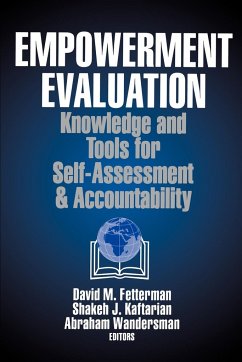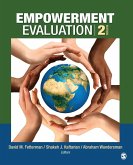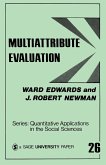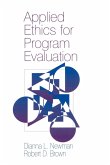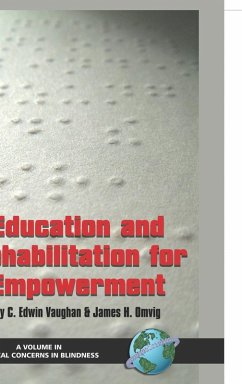David M. Fetterman, Shakeh J. Kaftarian, Abraham Wandersman
Empowerment Evaluation
Knowledge and Tools for Self-Assessment and Accountability
David M. Fetterman, Shakeh J. Kaftarian, Abraham Wandersman
Empowerment Evaluation
Knowledge and Tools for Self-Assessment and Accountability
- Broschiertes Buch
- Merkliste
- Auf die Merkliste
- Bewerten Bewerten
- Teilen
- Produkt teilen
- Produkterinnerung
- Produkterinnerung
Empowerment evaluation - a method for using evaluation concepts, techniques and findings to foster improvement and self-determination - is the focus of this book. After an examination of the method as it has been adopted in academic and foundation settings, the book looks at the various contexts in which empowerment evaluation is conducted, ranging from resistant environments to responsive environments. Critical concerns in empowerment evaluation, such as the role of empowerment theory and multiple levels of empowerment from individual to societal, are then discussed. The book also provides…mehr
Andere Kunden interessierten sich auch für
![Empowerment Evaluation Empowerment Evaluation]() David M. FettermanEmpowerment Evaluation135,99 €
David M. FettermanEmpowerment Evaluation135,99 €![Multiattribute Evaluation Multiattribute Evaluation]() Ward EdwardsMultiattribute Evaluation45,99 €
Ward EdwardsMultiattribute Evaluation45,99 €![Applied Ethics for Program Evaluation Applied Ethics for Program Evaluation]() Dianna L. NewmanApplied Ethics for Program Evaluation137,99 €
Dianna L. NewmanApplied Ethics for Program Evaluation137,99 €![Impact Analysis for Program Evaluation Impact Analysis for Program Evaluation]() Lawrence B. MohrImpact Analysis for Program Evaluation160,99 €
Lawrence B. MohrImpact Analysis for Program Evaluation160,99 €![How to Communicate Evaluation Findings How to Communicate Evaluation Findings]() Lynn Lyons MorrisHow to Communicate Evaluation Findings100,99 €
Lynn Lyons MorrisHow to Communicate Evaluation Findings100,99 €![Education and Rehabilitation for Empowerment (Hc) Education and Rehabilitation for Empowerment (Hc)]() C. Edwin VaughanEducation and Rehabilitation for Empowerment (Hc)106,99 €
C. Edwin VaughanEducation and Rehabilitation for Empowerment (Hc)106,99 €![Discretion and the Quest for Controlled Freedom Discretion and the Quest for Controlled Freedom]() Discretion and the Quest for Controlled Freedom108,99 €
Discretion and the Quest for Controlled Freedom108,99 €-
-
-
Empowerment evaluation - a method for using evaluation concepts, techniques and findings to foster improvement and self-determination - is the focus of this book. After an examination of the method as it has been adopted in academic and foundation settings, the book looks at the various contexts in which empowerment evaluation is conducted, ranging from resistant environments to responsive environments. Critical concerns in empowerment evaluation, such as the role of empowerment theory and multiple levels of empowerment from individual to societal, are then discussed. The book also provides tools and technical assistance needed to conduct empowerment evaluation. The concluding section of the book serves to strengthen the links between empowerment evaluation and community-capacity building.
Hinweis: Dieser Artikel kann nur an eine deutsche Lieferadresse ausgeliefert werden.
Hinweis: Dieser Artikel kann nur an eine deutsche Lieferadresse ausgeliefert werden.
Produktdetails
- Produktdetails
- Verlag: Sage Publications
- Seitenzahl: 424
- Erscheinungstermin: 25. Oktober 1995
- Englisch
- Abmessung: 229mm x 152mm x 25mm
- Gewicht: 685g
- ISBN-13: 9780761900252
- ISBN-10: 076190025X
- Artikelnr.: 21970277
- Herstellerkennzeichnung
- Libri GmbH
- Europaallee 1
- 36244 Bad Hersfeld
- gpsr@libri.de
- Verlag: Sage Publications
- Seitenzahl: 424
- Erscheinungstermin: 25. Oktober 1995
- Englisch
- Abmessung: 229mm x 152mm x 25mm
- Gewicht: 685g
- ISBN-13: 9780761900252
- ISBN-10: 076190025X
- Artikelnr.: 21970277
- Herstellerkennzeichnung
- Libri GmbH
- Europaallee 1
- 36244 Bad Hersfeld
- gpsr@libri.de
David M. Fetterman is a Consulting Professor of Education and the Director of Evaluation, Career Development, and Alumni Relations at Stanford University. Formerly, he was the Director of the MA Policy Analysis and Evaluation Program in the School of Education at Stanford University. He was Professor and Research Director at the California Institute of Integral Studies; Principal Research Scientist at the American Institutes for Research; and a Senior Associate and Project Director at RMC Research Corporation. He received his Ph.D. from Stanford University in educational and medical anthropology. David is a past president of the American Evaluation Association and the American Anthropological Associations Council on Anthropology and Education. He has conducted extensive multisite evaluation research on local, state, and national levels. Recognized for his contributions to the development of ethnography and ethnographic evaluation, he has recently focused on developing empowerment evaluationsto help people help themselvesthroughout the United States and in South Africa. They include a Hewlett Packard Philanthropy Digital Villages project, an Arkansas State Department of Education project, and a Hewlett Foundation One East Palo Alto community revitalization project. David was elected a fellow of the American Anthropological Association and the Society for Applied Anthropology. He received the Paul Lazarsfeld Award for Outstanding Contributions to Evaluation Theory and the Myrdal Award for Cumulative Contributions to Evaluation Practice; the George and Louise Spindler Award for outstanding contributions to educational anthropology as a scholar and practitioner; the Ethnographic Evaluation Award from the Council on Anthropology and Education; the Presidents Award from the Evaluation Research Society for contributions to ethnographic educational evaluation; and the Washington Association of Practicing Anthropologists Praxis Publication Award for translating knowledge into action. He has consulted for a variety of federal agencies, foundations, corporations, and academic institutions, including the U.S. Department of Education, National Institute of Mental Health, Centers for Disease Control; U.S. Department of Agriculture; W.K. Kellogg Foundation; Rockefeller Foundation; Walter S. Johnson Foundation; Annie E. Casey Foundation; Marin Community Foundation; universities throughout the United States and Europe, as well as foreign agencies and ministries, such as the Ministry of Education in Japan. Fetterman is the General Editor for Garland/Taylor and Francis Publications 'Studies in Education and Culture' series. He has contributed to the 'International Encyclopedia of Education', the 'Encyclopedia of Human Intelligence', and the 'Encyclopedia of Social Science Research Methods,' and the' Encyclopedia of Evaluation'. He is author of 'Foundations of Empowerment Evaluation'; 'Empowerment Evaluation: Knowledge and Tools for Self-Assessment and Accountability'; 'Speaking the Language of Power: Communication, Collaboration, and Advocacy'; 'Ethnography: Step by Step, Second Edition'; 'Qualitative Approaches to Evaluation in Education: The Silent Scientific Revolution'; 'Excellence and Equality: A Qualitatively Different Perspective on Gifted and Talented Education'; 'Educational Evaluation: Ethnography in Theory, Practice, and Politics'; and 'Ethnography in Educational Evaluation.' He recently coedited' Empowerment Evaluation: Principles in Practice'.
PART ONE: INTRODUCTION AND OVERVIEW
Empowerment Evaluation - David M Fetterman
An Introduction to Theory and Practice
PART TWO: BREADTH AND SCOPE
Empowerment Evaluation and Accelerated Schools - Henry M Levin
Empowerment Evaluation and the W K Kellogg Foundation - Ricardo A Millett
PART THREE: CONTEXT
Empowerment Evaluation and State Government - Joyce Keller
Moving from Resistance to Adoption
The HIV Prevention Evaluation Initiative - Cynthia Gómez and Ellen
Goldstein
A Model for Collaborative and Empowerment Evaluation
Empowerment Evaluation - Cheryl Grills et al
Building upon a Tradition of Activism in the African American Community
Realizing Participant Empowerment in the Evaluation of Nonprofit Women's
Services Organizations - Arlene B Andrews
Notes from the Front Line
PART FOUR: THEORETICAL AND PHILOSOPHICAL FRAMEWORKS
Empowering Community Health Initiatives through Evaluation - Stephen B
Fawcett et al
Empowerment Evaluation at Federal and Local Levels - Robert K Yin, Shakeh J
Kaftarian, and Nancy F Jacobs
Dealing with Quality
Evaluation and Self-Direction in Community Prevention Coalitions - John F
Stevenson, Roger E Mitchell, and Paul Florin
Fairness, Liberty, and Empowerment Evaluation - Dennis E Mithaug
PART FIVE: WORKSHOPS, TECHNICAL ASSISTANCE, AND PRACTICE
Empowering Community Groups with Evaluation Skills - Jean Ann Linney and
Abraham Wandersman
The Prevention Plus III Model
Participatory and Empowerment Evaluation - Margret A Dugan
Lessons Learned in Training and Technical Assistance
The Plan Quality Index - Frances D Butterfoss et al
An Empowerment Evaluation Tool for Measuring and Improving the Quality of
Plans
Building Community Capacity with Evaluation Activities That Empower -
Steven W Mayer
PART SIX: CONCLUSION
Conclusion - David M Fetterman
Reflections on Emergent Themes and the Next Steps
Empowerment Evaluation - David M Fetterman
An Introduction to Theory and Practice
PART TWO: BREADTH AND SCOPE
Empowerment Evaluation and Accelerated Schools - Henry M Levin
Empowerment Evaluation and the W K Kellogg Foundation - Ricardo A Millett
PART THREE: CONTEXT
Empowerment Evaluation and State Government - Joyce Keller
Moving from Resistance to Adoption
The HIV Prevention Evaluation Initiative - Cynthia Gómez and Ellen
Goldstein
A Model for Collaborative and Empowerment Evaluation
Empowerment Evaluation - Cheryl Grills et al
Building upon a Tradition of Activism in the African American Community
Realizing Participant Empowerment in the Evaluation of Nonprofit Women's
Services Organizations - Arlene B Andrews
Notes from the Front Line
PART FOUR: THEORETICAL AND PHILOSOPHICAL FRAMEWORKS
Empowering Community Health Initiatives through Evaluation - Stephen B
Fawcett et al
Empowerment Evaluation at Federal and Local Levels - Robert K Yin, Shakeh J
Kaftarian, and Nancy F Jacobs
Dealing with Quality
Evaluation and Self-Direction in Community Prevention Coalitions - John F
Stevenson, Roger E Mitchell, and Paul Florin
Fairness, Liberty, and Empowerment Evaluation - Dennis E Mithaug
PART FIVE: WORKSHOPS, TECHNICAL ASSISTANCE, AND PRACTICE
Empowering Community Groups with Evaluation Skills - Jean Ann Linney and
Abraham Wandersman
The Prevention Plus III Model
Participatory and Empowerment Evaluation - Margret A Dugan
Lessons Learned in Training and Technical Assistance
The Plan Quality Index - Frances D Butterfoss et al
An Empowerment Evaluation Tool for Measuring and Improving the Quality of
Plans
Building Community Capacity with Evaluation Activities That Empower -
Steven W Mayer
PART SIX: CONCLUSION
Conclusion - David M Fetterman
Reflections on Emergent Themes and the Next Steps
PART ONE: INTRODUCTION AND OVERVIEW
Empowerment Evaluation - David M Fetterman
An Introduction to Theory and Practice
PART TWO: BREADTH AND SCOPE
Empowerment Evaluation and Accelerated Schools - Henry M Levin
Empowerment Evaluation and the W K Kellogg Foundation - Ricardo A Millett
PART THREE: CONTEXT
Empowerment Evaluation and State Government - Joyce Keller
Moving from Resistance to Adoption
The HIV Prevention Evaluation Initiative - Cynthia Gómez and Ellen
Goldstein
A Model for Collaborative and Empowerment Evaluation
Empowerment Evaluation - Cheryl Grills et al
Building upon a Tradition of Activism in the African American Community
Realizing Participant Empowerment in the Evaluation of Nonprofit Women's
Services Organizations - Arlene B Andrews
Notes from the Front Line
PART FOUR: THEORETICAL AND PHILOSOPHICAL FRAMEWORKS
Empowering Community Health Initiatives through Evaluation - Stephen B
Fawcett et al
Empowerment Evaluation at Federal and Local Levels - Robert K Yin, Shakeh J
Kaftarian, and Nancy F Jacobs
Dealing with Quality
Evaluation and Self-Direction in Community Prevention Coalitions - John F
Stevenson, Roger E Mitchell, and Paul Florin
Fairness, Liberty, and Empowerment Evaluation - Dennis E Mithaug
PART FIVE: WORKSHOPS, TECHNICAL ASSISTANCE, AND PRACTICE
Empowering Community Groups with Evaluation Skills - Jean Ann Linney and
Abraham Wandersman
The Prevention Plus III Model
Participatory and Empowerment Evaluation - Margret A Dugan
Lessons Learned in Training and Technical Assistance
The Plan Quality Index - Frances D Butterfoss et al
An Empowerment Evaluation Tool for Measuring and Improving the Quality of
Plans
Building Community Capacity with Evaluation Activities That Empower -
Steven W Mayer
PART SIX: CONCLUSION
Conclusion - David M Fetterman
Reflections on Emergent Themes and the Next Steps
Empowerment Evaluation - David M Fetterman
An Introduction to Theory and Practice
PART TWO: BREADTH AND SCOPE
Empowerment Evaluation and Accelerated Schools - Henry M Levin
Empowerment Evaluation and the W K Kellogg Foundation - Ricardo A Millett
PART THREE: CONTEXT
Empowerment Evaluation and State Government - Joyce Keller
Moving from Resistance to Adoption
The HIV Prevention Evaluation Initiative - Cynthia Gómez and Ellen
Goldstein
A Model for Collaborative and Empowerment Evaluation
Empowerment Evaluation - Cheryl Grills et al
Building upon a Tradition of Activism in the African American Community
Realizing Participant Empowerment in the Evaluation of Nonprofit Women's
Services Organizations - Arlene B Andrews
Notes from the Front Line
PART FOUR: THEORETICAL AND PHILOSOPHICAL FRAMEWORKS
Empowering Community Health Initiatives through Evaluation - Stephen B
Fawcett et al
Empowerment Evaluation at Federal and Local Levels - Robert K Yin, Shakeh J
Kaftarian, and Nancy F Jacobs
Dealing with Quality
Evaluation and Self-Direction in Community Prevention Coalitions - John F
Stevenson, Roger E Mitchell, and Paul Florin
Fairness, Liberty, and Empowerment Evaluation - Dennis E Mithaug
PART FIVE: WORKSHOPS, TECHNICAL ASSISTANCE, AND PRACTICE
Empowering Community Groups with Evaluation Skills - Jean Ann Linney and
Abraham Wandersman
The Prevention Plus III Model
Participatory and Empowerment Evaluation - Margret A Dugan
Lessons Learned in Training and Technical Assistance
The Plan Quality Index - Frances D Butterfoss et al
An Empowerment Evaluation Tool for Measuring and Improving the Quality of
Plans
Building Community Capacity with Evaluation Activities That Empower -
Steven W Mayer
PART SIX: CONCLUSION
Conclusion - David M Fetterman
Reflections on Emergent Themes and the Next Steps

